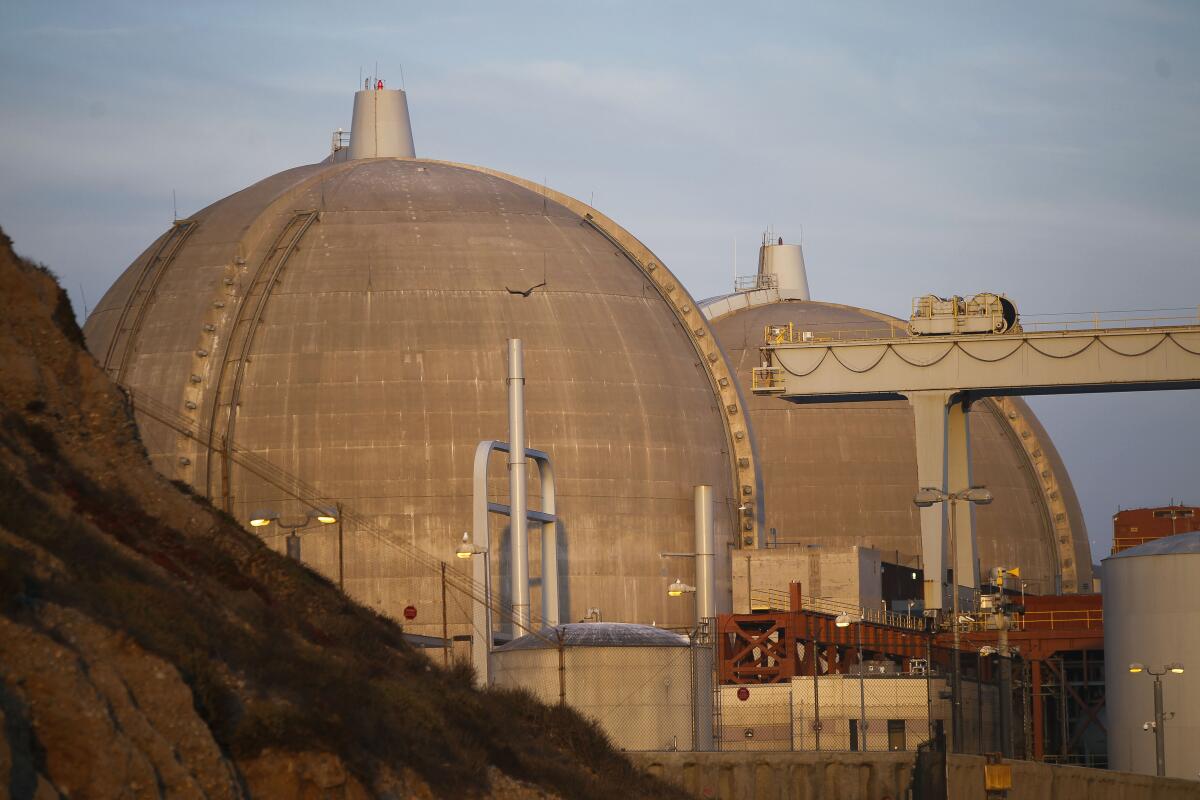Storage site for San Onofre nuclear waste gets a 13-year extension

The site’s permit was set to expire next month. “We’re in a challenging situation without any options from the federal government,” one commissioner said.
- Share via
San Diego — The California Coastal Commission on Thursday approved a 13-year extension to a permit for one of a pair of storage facilities that holds more than 50 canisters containing nuclear waste at the now-shuttered San Onofre Nuclear Generating Station.
The extension passed on a 9-0 vote but commissioners said they weren’t enthused with the prospect of spent nuclear fuel remaining at the plant for the foreseeable future because the U.S. government has not been able to find a permanent repository to store the waste from commercial nuclear facilities like the one in San Onofre.
“I have a lot of concerns [but] we’re in a challenging situation without any options from the federal government,” said Commissioner Effie Turnbull-Sanders.
The permit was extended to a storage facility at San Onofre where up to 63 canisters of spent fuel and other highly radioactive waste have been in operation since 2001. The storage site’s permit was set to expire next month.
A second, more recently built storage facility holds 73 canisters that have been lowered vertically into storage cavities. Its permit runs through October 2035.
Both storage sites sit at the north end of the San Onofre Nuclear Generating Station, known as SONGS for short.
Southern California Edison — the utility that operates the plant that is currently in the process of being dismantled — came to the commission and requested a 13-year extension so that both storage facilities will have permits that will run concurrently.
“Having those together, so that we’re looking at the totality of [both storage sites], seems to make sense to us and certainly it was the view of the Coastal Commission staff that it made sense as well,” said Manuel Camargo, manager of strategic planning at Edison and SONGS, after the meeting.
Camargo said aligning the timeline of the permits at both storage facilities will make it easier in the event that the sites need to be modified if sea level rise in the coming years exceeds current projections or if both permits need to be changed, should the federal government find places where canisters at SONGS could be sent.
The new permit calls for Edison to meet a number of conditions, including requiring the utility to provide an analysis of future coastal hazards, pay for a third-party review that ensures the canisters remain in good condition and report each year to the commission on any progress made on finding alternative locations for SONGS waste.
During the meeting, which was held at a Shelter Island hotel and conference center, a San Diego-based consumer group brought up concerns about one section of the permit. Public Watchdogs worried that a specific paragraph could open the door for waste canisters from other nuclear facilities — such as Diablo Canyon, operated by Pacific Gas & Electric — to potentially end up at SONGS.
Camargo said Edison had “no interest in storing spent fuel from another facility” and after follow-up questions from three commissioners, the language in the permit was cleaned up to ensure that SONGS will not accept any spent fuel from any other plant.
More than 3.55 million pounds of spent fuel dating back to the time when the plant was generating electricity for Southern California remains near the beach on San Onofre because — as is the case at nuclear plants across the country — the federal government has not found a permanent repository to store the roughly 86,000 metric tons of spent fuel that has built up over the decades at commercial nuclear facilities.
Yucca Mountain in Nevada had been slated to take the waste but the Obama administration cut off funding for the site in 2010, following years of protests from lawmakers in the Silver State who had long opposed the project. The federal government has recently announced plans to actively search for communities willing to accept the nation’s stockpile on an interim basis.
SONGS is in the process of being decommissioned and it’s currently in the third year of a scheduled eight-year, $4.5-billion dismantlement project that expects to see about 1.1 billion pounds of material removed by 2028.
More to Read
Sign up for Essential California
The most important California stories and recommendations in your inbox every morning.
You may occasionally receive promotional content from the Los Angeles Times.











